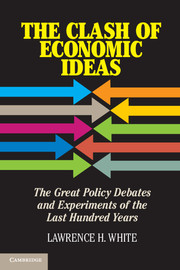Book contents
- Frontmatter
- Contents
- Figures
- Acknowledgments
- Introduction
- 1 The Turn Away from Laissez-Faire
- 2 The Bolshevik Revolution and the Socialist Calculation Debate
- 3 The Roaring Twenties and Austrian Business Cycle Theory
- 4 The New Deal and Institutionalist Economics
- 5 The Great Depression and Keynes’s General Theory
- 6 The Second World War and Hayek’s Road to Serfdom
- 7 Postwar British Socialism and the Fabian Society
- 8 The Mont Pelerin Society and the Rebirth of Smithian Economics
- 9 The Postwar German “Wonder Economy” and Ordoliberalism
- 10 Indian Planning and Development Economics
- 11 Bretton Woods and International Monetary Thought
- 12 The Great Inflation and Monetarism
- 13 The Growth of Government
- 14 Free Trade, Protectionism, and Trade Deficits
- 15 From Pleasant Deficit Spending to Unpleasant Sovereign Debt Crisis
- Index
- References
13 - The Growth of Government
Public Goods and Public Choice
Published online by Cambridge University Press: 05 June 2012
- Frontmatter
- Contents
- Figures
- Acknowledgments
- Introduction
- 1 The Turn Away from Laissez-Faire
- 2 The Bolshevik Revolution and the Socialist Calculation Debate
- 3 The Roaring Twenties and Austrian Business Cycle Theory
- 4 The New Deal and Institutionalist Economics
- 5 The Great Depression and Keynes’s General Theory
- 6 The Second World War and Hayek’s Road to Serfdom
- 7 Postwar British Socialism and the Fabian Society
- 8 The Mont Pelerin Society and the Rebirth of Smithian Economics
- 9 The Postwar German “Wonder Economy” and Ordoliberalism
- 10 Indian Planning and Development Economics
- 11 Bretton Woods and International Monetary Thought
- 12 The Great Inflation and Monetarism
- 13 The Growth of Government
- 14 Free Trade, Protectionism, and Trade Deficits
- 15 From Pleasant Deficit Spending to Unpleasant Sovereign Debt Crisis
- Index
- References
Summary
In 1959, Ronald Coase entered the Chicago home of Aaron Director for what was to be an unusual dinner party. The host and other guests were a who’s who of University of Chicago economists, including Milton Friedman, George Stigler, Arnold Harberger, John McGee, and fifteen others. The British-born and soft-spoken Coase, an economics professor at the University of Virginia, was in town to present a new paper at the university. In an earlier paper on the regulation of radio by the Federal Communications Commission, just published in the Journal of Law and Economics, Coase had made an argument that the Chicago crowd considered interesting but erroneous. The dinner was arranged to give Coase the chance he had requested to convince the skeptics that his argument was correct.
In his published paper Coase argued that participants in a competitive market economy can reach an efficient allocation of resources even when neighboring activities clash, or in current jargon they can “internalize” what would otherwise be “negative externalities,” by making mutually agreeable side payments. In the case of a doctor’s examination room bothered by a noisy candy factory next door, the doctor and confectioner can bargain to an efficient mix of respective operating hours. And not only can the market reach an efficient allocation, but it will reach the same efficient allocation no matter which way (e.g., to the doctor or to the confectioner) the law initially assigns the rights in dispute or conversely assigns the liability for damages caused by the clash, assuming negligible transaction costs and profit-maximizing behavior. Stigler labeled this proposition “the Coase theorem.” In the case of potential interference among radio broadcasters, the main topic of Coase’s 1959 paper, a system of tradable private property rights in distinct broadcast frequencies will allow competing broadcasters to avoid wavelength interference and to reach the efficient mix of station formats (news, talk, various types of music). No top-down assignment of licenses was necessary.
- Type
- Chapter
- Information
- The Clash of Economic IdeasThe Great Policy Debates and Experiments of the Last Hundred Years, pp. 332 - 359Publisher: Cambridge University PressPrint publication year: 2012



